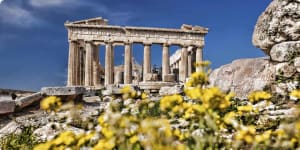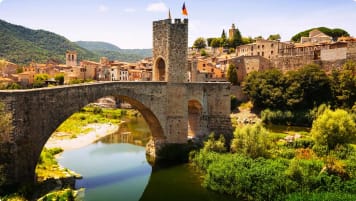Greece small group escorted history tour
Our 22 day small group tour explores the land of great philosophers, myths, and legends. We will learn about the culture and heritage of modern Greece whilst exploring and learning Athens, which only found independence in its uprising from the Ottoman Empire in the 19th century.
From $12,828CAD

Highlights
- 1. See Corinth and the Corinth Canal.
- 2. Explore Delphi and its Oracle.
- 3. Explore The Greek Millionaires’ Islands, once home to shipping tycoons such as Onassis and Niarchos.
- 4. In Athens explore the place where Western Civilisation began: the Parthenon and its museum.
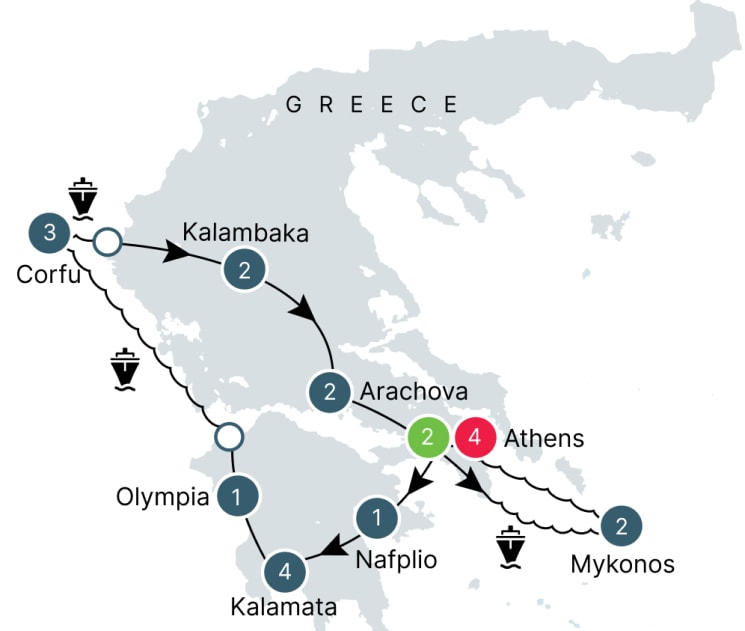
Departure Dates
| Departure Date | Price |
|---|---|
| 02 May 2025 Ends 23 May 2025 • 22 days $12,828 Twin $14,660 Single Available | Selected |
| 07 September 2025 Ends 28 September 2025 • 22 days $12,828 Twin $14,660 Single Available | |
| 04 May 2026 Ends 25 May 2026 • 22 days $12,828 Twin $14,660 Single Available | |
| 20 September 2026 Ends 11 October 2026 • 22 days $12,828 Twin $14,660 Single Available |
Greece Small Group Tour
Odyssey Traveller's 22-day Greece small group tour begins and ends in Athens. This Greece tour explores the wonders of the Ancient World and is designed for seniors and mature-aged travellers.
Greece (Greek: Ελλάς, Hellas) is located in sun-drenched southern Europe, on the southernmost tip of the Balkan peninsula. It has extensive coastlines and hundreds of inhabited islands in the Aegean Sea, Ionian Sea, and Mediterranean Sea. Greece is famous for giving birth to democracy, for its ancient culture that has had a significant influence on the world, and for its mountainous mainland and the blue waters of its idyllic island beaches.
Ancient Greece laid the foundation for many of the empires that followed. As we know, the Romans imitated Greek engineering and architecture. In addition, Greece gave the world great literature and thought via its playwrights, historians, and philosophers. Ancient Greece also made major contributions to the sciences, notably via Pythagoras and Archimedes.
On this fully escorted guided tour, we visit various destinations in Greece with our Program Leader and tour guide and wonder at what remains of its ancient civilisation whilst exploring its ancient ruins, monuments, and natural beauty. On our excursions, we will also sample the best of Greek cuisine.
Greece Small Group Tour Highlights & Itinerary
On our trip to Greece, we explore the birth of Western civilisation and mythology. As such, we experience first-hand the icons and heritage of Ancient Greece. This guided tour of Greece is fully escorted, with a program leader for the duration. Together, we draw on the knowledge of local experts and historians to understand the historic townships we visit. In doing so, we deepen our knowledge of the culture and heritage of modern Greece.
During the 22 days of our educational sightseeing tour, we stop in 9 different locations, staying between 1 to 4 nights in each. The small group tour commences in Athens. Several of these locations go well beyond the usual tourist route. As such, we will have the chance to explore areas where few other tourists venture on their Greek vacation. This is particularly true of the Kalamata region.
This journey also takes travellers into the mountainous interior and the rugged coastline of the Peloponnese. Here, we see the diversity of the Greek isles. We experience the fertile Ionian island of Corfu, with its rugged mountains. Afterwards, we take in the rocky sun-drenched island of Mykonos. Finally, the group visits the Island of Delos in the Aegean. In addition, we also visit the ancient cities of Corinth, Delphi, and Olympia. Each of these is a UNESCO World Heritage Site, protected for their cultural value. There will also be ample time in Athens to discover the ancient Acropolis and Acropolis museum, as well as the Parthenon.
This tour is paired with the Odyssey Traveller program to Turkey. We also offer a tour of the Eastern Mediterranean Islands, which visits Santorini, Crete, and Cyprus.
You can learn more about Greece with Odyssey's country profile, where all other tour departures are listed as well. For more details on this tour, click the ‘Top 5’ or ‘Itinerary’ buttons above! If you’re keen to experience this tour, please call or send an email. Or, to book, simply fill in the form on the right hand side of this page.
You may also wish to visit these external links on Greece to extend your knowledge and understanding:
Gallery
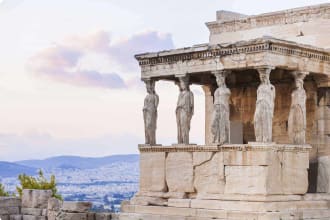
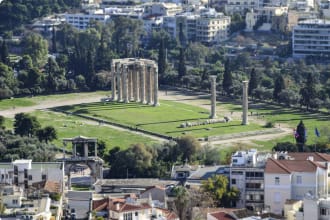
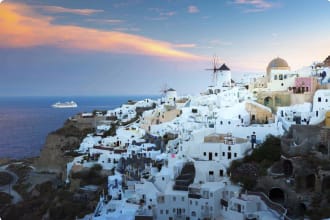
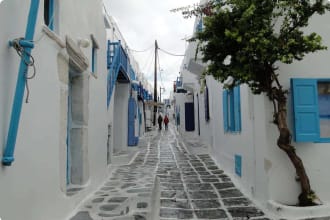
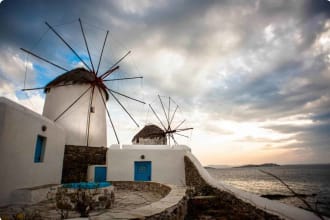
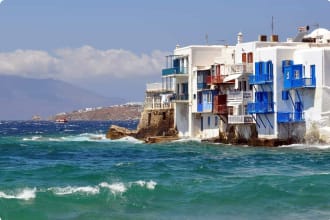
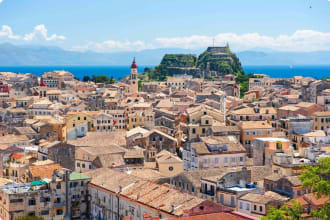
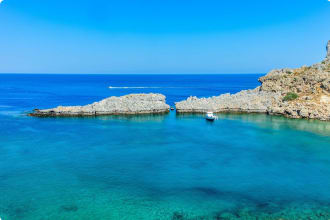
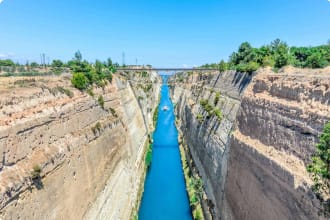
Itinerary
22 days
Day 1: Athens
Accommodation: Novotel Athens or similar.
Upon arrival in Athens we will make our way to the hotel individually. Our tour begins with a welcome meeting with our Tour Leader at the hotel, followed by dinner.
Athens is the home of the Acropolis and ancient archaeological sites, such as the Plaka with its mix of neoclassical, Turkish, and Greek island architecture. Athens features a mixture of classical Greek, Byzantine, Ottoman, and modern architecture.
Ringed by mountains and conveniently located near Piraeus (its Mediterranean port), Athens epitomises both ancient and modern Greece. Here we are introduced to Greek history as we experience this ancient city. We will learn about the influence of past civilisations and experience the many examples of ancient monuments which give testimony to the richness of the Ancient Greek culture.
Day 2: Athens
Accommodation: Novotel Athens or similar.
Today we learn about Greek history and culture with a visit to arguably the city’s most famous archaeological site, the Acropolis, dominated by the Parthenon. We also view the city’s major icons, including Constitution Square and the Plaka, with its medieval town and Byzantine monuments. The evening is free for us to explore the city at leisure.
Day 3: Nafplio
Accommodation: Agamemnon Hotel or similar.
We depart Athens and and cross the famous Corinth Canal to the virtual island of the Peloponnese. We overnight in the beautiful port town of Nafpolio. There will be time to wander through the Old Town cobblestone alleys and admire the neoclassical buildings.
Day 4: Kalamata
Accommodation: Hotel Messinian Bay or similar.
Today we experience Epidaurus, famed for its UNESCO World Heritage Listed theatre, arguably the most outstanding in the ancient world. We then continue to Mycenae, site of the Lion Gate and Agamemnon’s tomb. We then continue to our base in the Peloponnese, the city of Kalamáta, where we will have dinner at the hotel.
Kalamáta, the most important city in the Peloponnese, has been occupied by the Franks, Angevins, Venetians, Byzantines, and Ottoman Turks. The area played an important role in the struggle for Greek independence. Its location enables convenient exploration of the southern Peloponnese and allows us to learn about the rich history and independent people of the southern Peloponnese.
Day 5: Kalamata
Accommodation: Hotel Messinian Bay or similar.
Today we have a full day’s field trip to ancient Sparta, which was at the height of its power between the 8th and the 4th centuries BC, and Byzantine Mystras, with its many churches and Despots’ Palace.
Day 6: Kalamata
Accommodation: Hotel Messinian Bay or similar.
A full day’s field trip takes us from the Acropolis of Sparta to the 13th century BC Palace of the Mycenaean King Nestor. We then skip forwards through more than a millenia of western history to visit Venetian port of Methroni, followed by the the stylish town of Pylos, dominated by its medieval castle and fine natural harbour. We finish the day with dinner at our hotel.
Day 7: Kalamata
Accommodation: Hotel Messinian Bay or similar.
Today we explore the spectacular natural phenomenon of The Diros Caves, as well as the coastal villages and outstanding scenery of the Mani Peninsula. Dinner is again provided at the hotel.
Day 8: Olympia
Accommodation: Amalia Hotel or similar.
En route to the northern edge of the Peloponnese, we learn about the local production of wine and famed Kalamata olives at the Mercury Estate.The Mercury family is one of Greece’s most respected vintners. We learn about the production of cava in the wine cellar and small private museum and taste the Ktima Mercuris vintages. After we take a walk through the vineyards, we travel to Olympia, ancient home of the Olympic Games, to visit the Olympia Archaeological Museum and the Courbertin Monument. We will have a group dinner at our new hotel.
Day 9: Corfu
Accommodation: Hotel City Marina or similar.
We start our day with a short introduction and tour of Patras, the largest town in the Peloponnese and second port of Greece. We visit St. Andrew’s Church, dedicated to Patras’ patron Saint. The town of Patras was converted to Christianity by St. Andrew during the reign of Nero. From here we cross the new Rio-Antrio Bridge over the the Gulf of Corinth back to mainland Greece. We travel north to the Island of Corfu. Our journey takes us past Mesolongi, where Byron’s heart is buried, Agrinio, and the traditional market town of Arta, before we board our ferry at Igoumenitsa to Corfu. We will finish the day with a meal at the hotel.
Day 10: Corfu
Accommodation: Hotel City Marina or similar.
Today we visit we will have a tour of the main sights of Corfu Town. We take a guided walk through the city, where we learn how it has enjoyed unspoiled renovation since many of its finest buildings were destroyed in World War II.
The island of Corfu, located in the Ionian Sea between Italy and the west coast of mainland Greece, is renowned as a popular tourist attraction. Its history reflects Western European influence with occupation since the 14th century by Venetians, French, and British. It is verdant with olive groves, mountains, and woodlands, providing a setting for picturesque scenery. Corfu’s massive forts and fine buildings reflect the architectural styles of Venetian, French, and British occupation, and we learn about the island’s place in European history. Today’s field trip allows us to explore some of the island villages such as scenic Palaiokastritsa with its 17th century monastery.
Day 11: Corfu
Accommodation: Hotel City Marina or similar.
This morning we will have a guided tour of Palaiokastritsa, including its famous Monastery. On the way back to Corfu Town we will stop off at Achilleion Palace.
Day 12: Kalambaka
Accommodation: Hotel Kosta Famissi or similar.
After a return ferry to the mainland, we travel via the Ottoman stronghold of Ioannina into the mountainous heartland of Greece. Here we enjoy a short city tour and visit to the Island. We then continue to the mountain town of Metsovo before arriving at our hotel in Kalambaka for dinner.
Day 13: Kalambaka
Accommodation: Hotel Kosta Famissa or similar.
From the vicinity of Kalambaka we visit two of the ancient Meteoran monasteries, among the most memorable sights of mainland Greece. These monasteries, perched precariously on rock pinnacles, have been used by religious communities since the late 10th century. In previous times access was by ladder or rope, but roads and pathways provide better access today. Here we learn about their ancient origins and history and observe their rich collections of frescoes and icons.
Day 14: Arachova (near Delphi)
Accommodation: Hotel Ellinion Thea or similar.
En route to Delphi we pass the typical market town of Lamia before stopping at Thermopylae – the place of the hot springs – the location of Leonidas of Sparta’s famous resistance against Xerxes I, which has since become one of the defining stories of the classical era.
Day 15: Arachova (near Delphi)
Accommodation: Hotel Ellinion Thea or similar.
Believed by the Ancient Greeks to be the centre of the earth, Delphi is set on the slopes of Mount Parnassos. One of the most important religious centres in Greece, it is here that the Ancients consulted the “Oracle” at the sanctuary of Apollo. The rocky slopes, strewn with ruins, where olive, pine, and cypress tenuously seek out an existence, add to the mysterious aura which pervades the area, providing one of the most impressive experiences in Greece. Here we learn about the cultural significance of Delphi as we experience this ancient site.
Our field trip today visits UNESCO World Heritage Listed Delphi Archaeological Site and Museum with its famous bronze Charioteer. There will be some free time to explore ancient Delphi.
Day 16: Mykonos
Accommodation: Hotel Petinos or similar.
Today we will board our ferry in Rafina to Mykonos, where there is free afternoon allocated for to enjoy the town at your leisure. We will meet back at the hotel for dinner in the evening.
Day 17: Mykonos
Accommodation: Hotel Petinos or similar.
Mykonos is one of the major islands of the Cyclades. With its blue-domed Orthodox churches, white-washed villages and windmills, it is the archetypal postcard image of Island Greece. The island was under Venetian rule for many centuries, but flourished as a self- sufficient society under the community of Mykonians. The island once attracted a considerable number of European writers, intellectuals, and painters, but now is regarded as one of the glitziest islands of Greece. We explore the island and learn about its history. We also include a field trip to UNESCO World Heritage Listed Delos, with its famous Lion Terrace. There will be free time this afternoon in Mykonos to explore Mykonos town and island.
Day 18: Mykonos to Athens
Accommodation: Novotel Athens or similar.
We have a morning at leisure in Mykonos town, a maze of dazzling white alleys, fisherman’s dwellings, and convoluted streets, nooks, and crannies designed to confuse 18th and early 19th century pirates. Today the town’s layout has the same effect on visitors and getting lost in Mykonos town is all part of the experience. We may like to explore the Folk Museum with its collection of ceramics, embroidery, and Mykonian textiles plus the nearby 16th century Vonis windmill or visit the asymmetrical hodgepodge of 4 chapels which make up the oldest church in Mykonos – the Paraportiani – and stroll through Little Venice with its arcaded Venetian houses built to the water’s edge.
In the afternoon we transfer to Athens, in time for dinner at the hotel.
Day 19: Athens
Accommodation: Novotel Athens or similar.
Today we explore the National Archaeological Museum. It is the largest museum in Greece and one of the world’s great museums. Although its original purpose was to secure all the finds from the 19th century excavations in and around Athens, it gradually became the central National Archaeological Museum and was enriched with finds from all over Greece. Its abundant collections, with more than 11,000 exhibits, provide a panorama of Greek civilisation from the beginnings of Prehistory to Late Antiquity.
The museum is housed in an imposing late 19th century neoclassical building, which was designed by L. Lange and remodeled by Ernst Ziller.
Day 20: Athens
Accommodation: Novotel Athens or similar.
After a morning at leisure we have an afternoon’s field trip to Cape Sunion, Homer’s “sacred headland,” dominated by the Temple of Poseidon. Our included dinner is at a local restaurant at the Cape.
Day 21: Athens
Accommodation: Novotel Athens or similar
Today we explore sights of Athens at leisure and perhaps have the opportunity to explore the small tavernas of the Plaka. Tonight we take a coach to a local restaurant, where we will have a lively farewell meal surrounded by local music and entertainment.
Day 22: Athens
The tour concludes after breakfast in Athens.
Tour Notes
- Group size is limited to a maximum of 18 participants.
Includes / Excludes
What’s included in our Tour
- 21 nights of hotel accommodation.
- 21 breakfasts and 12 dinners.
- Transport, ferry travel and field trips as indicated.
- Applicable entry fees and services of local guides.
- Services of a Tour Leader.
- Service charges and gratuities.
- Detailed tour information booklet.
What’s not included in our Tour
- International airfare and departure taxes.
- Comprehensive travel insurance.
- Items of personal nature such as laundry and telephone calls.
Participants must be able to carry their own luggage, climb and descend stairs, be in good health, mobile and able to participate in 3-5 hours of physical activity per day, the equivalent of walking / hiking up to 8 kilometers per day on uneven ground.
Book now
Make it a private tour
Easing your journey
Crossing international borders with restrictions
The list of requirements to travel internationally has changed and will continue to change for several years. Odyssey is here to assist you in managing your way through these requirements:
For more information see our Crossing international borders with restrictions page.
Book With Confidence
If less than 30 days before your tour starts you are unable to travel as a result of Government travel restrictions, Odyssey Traveller will assist you with a date change, provide you with a credit or process a refund for your booking less any non-recoverable costs.
See Terms and conditions for details.
Peace of Mind Travel
The safety of our travellers, tour leader, local guide and support staff has always been our top priority and with the new guidelines for public health and safety for keeping safe for destinations around the world, we’ve developed our plan to give you peace of mind when travelling with us.
See Peace of Mind Travel for details.
Reading List Download PDF
A Brief History of Greece
Christos Visvardis
From the Neolithic Period to today's economic crisis, via Ancient Athens, the Persian Wars, Alexander the Great, the Byzantine Empire and two world wars, this book narrates the history of Greece with all the significant events that shaped it.
The Oxford History of Greece & the Hellenistic World
John Boardman (Editor), Jasper Griffin (Editor), Oswyn Murray (Editor)
From the epic poems of Homer to the glittering art and architecture of Greece's Golden Age, to the influential Roman systems of law and leadership, the classical Greek world established the foundations of our culture as well as many of its most enduring achievements.
Now, in this vivid volume, readers can embrace the spirit of the classical world, from the eighth to the first centuries B.C., a period unparalleled in history for its brilliance in literature, philosophy, and the visual arts. This work also treats the Hellenization of the Middle East by the monarchies established in the area conquered by Alexander the Great. The editors, all celebrated classicists, intersperse chapters on political and social history with sections on literature, philosophy, and the arts, and reinforce the historical framework with maps and historical charts. Moreover, the contributors--thirty of the world's leading scholars--present the latest in modern scholarship through masterpieces of wit, brevity, and style. Together with hundreds of excellent illustrations, these entries provide both a provocative and entertaining window into our classical heritage.
A Concise History of Greece (Cambridge Concise Histories)
Richard Clogg
Now re-issued in a third, updated edition, this book provides a concise, illustrated introduction to the modern history of Greece, from the first stirrings of the national movement in the late eighteenth century to the present day. The current economic crisis has marked a turning point in the country's history. This third edition includes a new final chapter, which analyses contemporary political, economic and social developments. It includes additional illustrations together with updated tables and suggestions for further reading. Designed to provide a basic introduction, the first edition of this hugely successful Concise History won the Runciman Award for the best book on an Hellenic topic published in 1992 and has been translated into twelve languages.
The Rise and Fall of Classical Greece
Josiah Ober
Lord Byron described Greece as great, fallen, and immortal, a characterization more apt than he knew. Through most of its long history, Greece was poor. But in the classical era, Greece was densely populated and highly urbanized. Many surprisingly healthy Greeks lived in remarkably big houses and worked for high wages at specialized occupations. Middle-class spending drove sustained economic growth and classical wealth produced a stunning cultural efflorescence lasting hundreds of years.
Why did Greece reach such heights in the classical period--and why only then? And how, after "the Greek miracle" had endured for centuries, did the Macedonians defeat the Greeks, seemingly bringing an end to their glory? Drawing on a massive body of newly available data and employing novel approaches to evidence, Josiah Ober offers a major new history of classical Greece and an unprecedented account of its rise and fall.
Ober argues that Greece's rise was no miracle but rather the result of political breakthroughs and economic development. The extraordinary emergence of citizen-centered city-states transformed Greece into a society that defeated the mighty Persian Empire. Yet Philip and Alexander of Macedon were able to beat the Greeks in the Battle of Chaeronea in 338 BCE, a victory made possible by the Macedonians' appropriation of Greek innovations. After Alexander's death, battle-hardened warlords fought ruthlessly over the remnants of his empire. But Greek cities remained populous and wealthy, their economy and culture surviving to be passed on to the Romans--and to us.
A compelling narrative filled with uncanny modern parallels, this is a book for anyone interested in how great civilizations are born and die.
Modern Greece: What Everyone Needs to Know
Stathis Kalyvas
When Greece's economic troubles began to threaten the stability of the European Union in 2010, the nation found itself in the center of a whirlwind of international finger-pointing. In the years prior, Greece appeared to be politically secure and economically healthy. Upon its emergence in the center of the European economic maelstrom, however, observers and critics cited a century of economic hurdles, dictatorships, revolutions, and more reasons as to why their current crisis was understandable, if not predictable. The ancient birthplace of democracy and countless artistic, literary, philosophical, and scientific developments had struggled to catch-up to its economically-thriving neighbors in Western Europe for years and quickly became the most seriously economically-troubled European country following a fiscal nosedive beginning in 2008. When the deficit and unemployment skyrocketed, the resulting austerity measures triggered widespread social unrest.
The entire world turned its focus toward the troubled nation, waiting for the possibility of a Greek exit from the European Monetary Union and its potential to unravel the entire Union, with other weaker members heading for the exit as well. The effects of Greece's crisis are also tied up in the global arguments about austerity, with many viewing it as necessary medicine, and still others seeing austerity as an intellectually bankrupt approach to fiscal policy that only further damages weak economies.
In Modern Greece: What Everyone Needs to Know®, Stathis Kalyvas, an eminent scholar of conflict, Europe, and Greece combines the most up-to-date economic and political-science findings on the current Greek crisis with a discussion of Greece's history. Tracing the nation's development from the early nineteenth century to the present, the informative question-and answer format covers key episodes including the independence movement of the early nineteenth century, the massive ethnic cleansing in Turkey and Greece following World War I, the German occupation in World War II, the following brutal civil war, the conflict with Turkey over Cyprus, the military coup of 1967, democracy at long last, and the country's entry into the European Union.
Written by one of the most brilliant political scientists in the academy, Modern Greece is the go-to resource for understanding both the current crisis and the historical events that brought the country to where it is today.
Greece: A Short History of a Long Story, 7,000 BCE to the Present
Carol G. Thomas
Greece: A Short History of a Long Story presents a comprehensive overview of the history of Greece by exploring the continuity of Greek culture from its Neolithic origins to the modern era.
~ Tells the story of Greece through individual personalities that inhabited various periods in the lengthy sweep of Greek history
~ Uses an approach based on recent research that includes DNA analysis and analyses of archaeological materials
~ Explores ways in which the nature of Greek culture was continually reshaped over time
~ Features illustrations that portray the people of different eras in Greek history along with maps that demonstrate the physical sphere of Greece and major events in each of the periods
The Full Catastrophe: Travels Among the New Greek Ruins
James Angelos
A transporting, good-humored, and revealing account of Greece’s dire troubles, reported from the mountain villages, idyllic islands, and hardscrabble streets that define the country today
In recent years, small Greece, often associated with ancient philosophers and marble ruins, whitewashed villages and cerulean seas, has been at the center of a debt crisis that has sown economic and social ruin, spurred panic in international markets, and tested Europe’s decades-old project of forging a closer union.
In The Full Catastrophe, James Angelos makes sense of contrasting images of Greece, a nation both romanticized for its classical past and castigated for its dysfunctional present. With vivid character-driven narratives and engaging reporting that offers an immersive sense of place, he brings to life some of the causes of the country’s financial collapse, and examines the changes, some hopeful and others deeply worrisome, emerging in its aftermath. A small rebellion against tax authorities breaks out on a normally serene Aegean island. A mayor from a bucolic, northern Greek village is gunned down by the municipal treasurer. An aging, leftist hero of the Second World War fights to win compensation from Germany for the wartime occupation. A once marginal group of neo-Nazis rises to political prominence out of a ramshackle Athens neighborhood.
The Full Catastrophe goes beyond the transient coverage in the daily headlines to deliver an enduring and absorbing portrait of modern Greece.
